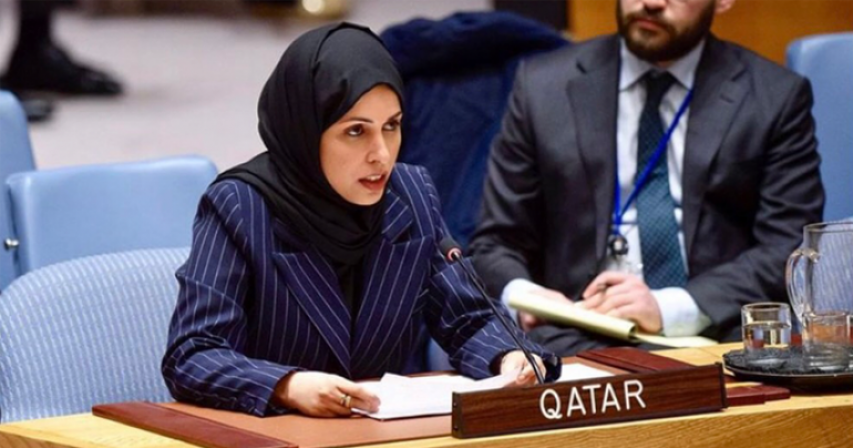Qatar Reiterates Commitment to Support ICJ Contributions to Peaceful Settlement of Disputes
- 3 years ago

The State of Qatar reiterated its commitment to support the contributions of the International Court of Justice (ICJ) to the peaceful settlement of disputes and the maintenance of international peace and security.
Addressing a Plenary Meeting: Report of the International Court of Justice in the framework of the 75th session of the UN General Assembly, HE Permanent Representative of the State of Qatar to the United Nations Ambassador Sheikha Alya Ahmed bin Saif Al-Thani stressed the State of Qatar's adherence to the role played by the International Court of Justice in settling disputes by peaceful means, noting the State's record of respecting international judicial institutions and adhering to its decisions, especially the International Court of Justice.
HE the Ambassador affirmed the keenness of the State of Qatar on resorting to the International Court of Justice, referring to the lawsuit filed by the State of Qatar before the Court regarding the implementation of the International Convention on the Elimination of All Forms of Racial Discrimination against the United Arab Emirates.
She noted that the ICJ issued an order on July 23, 2018 approving the request of the State of Qatar to take provisional measures against the United Arab Emirates which took discriminatory measures against Qatari citizens, in violation of the International Convention on the Elimination of All Forms of Racial Discrimination, pointing to the second order of the ICJ in the same case dated June 14, 2019 which includes the Courts rejection of the UAEs request to take provisional measures against the State of Qatar.
HE the Ambassador said that although more than two years have passed since the issuance of the first order by the ICJ, the United Arab Emirates has not taken the necessary measures to enable citizens and residents of the State of Qatar affected by the discriminatory measures to use the legal means stipulated in the Court's order. She underlined that the UAE's behavior constitutes a violation of the legal rules that stipulate respect for the decisions and rulings of the International Court of Justice, as the main judicial organ in the United Nations.
Her Excellency also highlighted the ruling issued by the International Court of Justice on July 14, 2020 rejecting the two appeals filed by the Kingdom of Bahrain, the Arab Republic of Egypt, the Kingdom of Saudi Arabia and the United Arab Emirates, regarding the competence of the International Civil Aviation Organization to consider the complaint of the State of Qatar, indicating that the ruling was issued on background of these countries' closure of their airspace to Qatari aircraft since the illegal blockade was imposed on the State of Qatar on June 5, 2017, and preventing Qatari planes from flying over the territories of those countries or landing at their airports. HE the Ambassador stressed that the procedures of the blockading countries constitute a flagrant violation of international law, the Chicago Convention and the convention on international air transport on services.
Despite the ruling of the International Court of Justice that was adopted unanimously, the blockading countries are still imposing a comprehensive ban on Qatari aircraft, without taking into account the legal and humanitarian consequences resulting from this, especially in light of the unprecedented global crisis caused by the COVID-19 pandemic, HE Ambassador Sheikha Alya Ahmed bin Saif Al-Thani continued.
HE the Ambassador affirmed the steadiness of the legal position adopted by the State of Qatar, and its keenness on the security and stability of the region.
She warned of the dangers of non-compliance with the orders of the International Court of Justice, as it is the main judicial organ of the United Nations, stressing that the text and spirit of the United Nations Charter requires that no tolerance be given to the failure to implement the court's decisions, and to find adequate means to oblige states to implement those decisions in good faith.
Her Excellency noted the special importance of the General Assembly's discussion of the Report of the International Court of Justice this year, especially as this meeting coincides with the 75th anniversary of founding the United Nations, as the San Francisco Conference recognized that the statute of the ICJ is an integral part of the United Nations Charter, and that the ICJ is one of the six major organs of the organization.
In light of the challenges facing international peace and security, HE the Ambassador stressed the need to support the work of the ICJ more than ever before, noting that this requires sufficient budget and resources to enable the Court to fulfill its vital legal mission for the international community, and to contribute to achieving the goals of the United Nations and ensuring respect for international law.
In conclusion, HE Permanent Representative of the State of Qatar to the United Nations Ambassador Sheikha Alya Ahmed bin Saif Al-Thani reiterated the commitment of the State of Qatar to support the contributions of the International Court of Justice to the peaceful settlement of disputes and the maintenance of international peace and security, reaffirming Qatar's adherence to the decisions issued by the Court, as the main judicial organ of the United Nations.
Comments